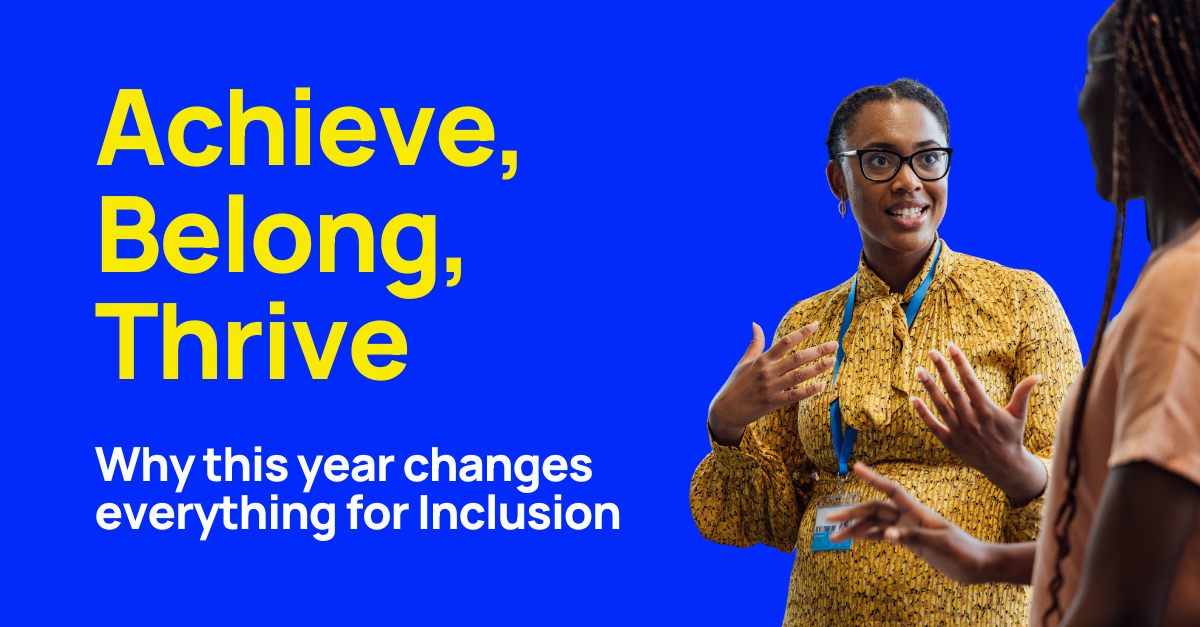Achieve, Belong, Thrive: Why This Year Changes Everything for Inclusion
This academic year marks a decisive shift for education leaders.
In September, Ofsted launched its 2025 framework, introducing scorecard metrics that hold schools accountable for how well every learner can achieve, belong, and thrive. At the same time, the Global Equality Collective released our first report 26,000 Voices and the Inclusion Index — the largest dataset of staff and student perspectives on inclusion in UK schools.
The findings are clear: gaps remain between aspiration and reality. Students and staff continue to report feeling unheard, unsupported, and unseen.
These insights arrive alongside the Education Select Committee’s recent report on inclusion and equity, which highlighted systemic challenges around representation, SEND, and staff retention. With the forthcoming DfE White Paper, we can already see the direction of travel: inclusion will be addressed through data-driven accountability, stronger leadership expectations, and practical frameworks for improvement.
The GEC Platform was developed to connect data for inclusion with practical strategies for change. We call this the report and support model. It is just how we roll.
Therefore, below, this is our take on how the Education Select Committee report (with spotlit excerpts) matches the Ofsted framework — and how leaders can get intentional about inclusion.
BELONG: Embedding Representation and Voice
🌟 “The voices of young people should be embedded in school decision-making, particularly around issues of inclusion and wellbeing.” — Education Select Committee Report (2025)
Ofsted (2025): Inspectors now evaluate how pupil voice is gathered, acted upon, and embedded in governance.
GEC Data: Only 21.2% of non-disclosure students feel heard by teachers.
Response: Structured feedback tools help embed student voice into governance and improvement cycles.
🌟 “Schools must do more to ensure that pupils feel represented and valued in the curriculum and wider school life.” — Education Select Committee Report (2025)
Ofsted (2025): Belonging is assessed through curriculum representation and inclusivity.
GEC Data: 33.2% of students say they feel invisible in the curriculum.
Response: Data on representation gaps gives leaders clarity, alongside resources to inform curriculum planning.
🌟 “Leaders who create safe spaces for dialogue enable honest conversations about discrimination, belonging, and representation.” — Education Select Committee Report (2025)
Ofsted (2025): Belonging includes evidence that schools foster safe, respectful cultures.
GEC Data: Students reported that schools often “avoid the difficult conversations.”
Response: Practical CPD and facilitation resources support leaders to hold these conversations safely.
ACHIEVE: Breaking Down Barriers to Opportunity
🌟 “Students with special educational needs and disabilities continue to face barriers in assessment and classroom practice that limit their outcomes.” — Education Select Committee Report (2025)
Ofsted (2025): Achievement metrics track how well schools meet the needs of SEND learners.
GEC Data: 34% of SEND students strongly disagree that their needs are supported in classrooms.
Response: Data highlights SEND and invisible disability experiences to inform inclusive assessment.
🌟 “Professional development and progression opportunities for staff are often inequitable, with underrepresented groups experiencing the most disadvantage.” — Education Select Committee Report (2025)
Ofsted (2025): Leadership is judged on how schools support equitable staff development.
GEC Data: Staff from underrepresented groups report limited access to CPD and progression.
Response: Targeted CPD and mentoring approaches help diversify the leadership pipeline.
🌟 “Evaluation of CPD should include feedback from participants to ensure training is impactful and relevant.” — Education Select Committee Report (2025)
Ofsted (2025): Inspectors look for evidence of CPD impact and responsiveness.
GEC Data: Staff highlight inequitable CPD as a tipping point for retention.
Response: Continuous CPD feedback mechanisms make training iterative and impactful.
THRIVE: Building Inclusive Cultures and Responsive Systems
🌟 “Pastoral care and safeguarding need to be more responsive to the diverse needs of pupils, particularly those from marginalised groups.” — Education Select Committee Report (2025)
Ofsted (2025): Thrive metrics include wellbeing, safety, and belonging.
GEC Data: Only 12% of students report feeling fully included in their school environment.
Response: Frameworks and CPD tools help staff build responsive, equitable pastoral systems.
🌟 “Policies must be consistently applied to ensure equity. Inconsistent practice undermines trust and widens inequality.” — Education Select Committee Report (2025)
Ofsted (2025): Leaders are expected to demonstrate consistent and equitable practice.
GEC Data: Staff highlight inconsistency in how policies are applied, leading to exclusion.
Response: Kaleidoscopic Data provides leaders with evidence to inform and adapt policy.
🌟 “Data collection should not only measure outcomes but also capture experiences to provide a fuller picture of inclusion.” — Education Select Committee Report (2025)
Ofsted (2025): Inspectors require evidence of both outcomes and lived experiences to judge inclusion.
GEC Data: Traditional attainment data missed that a third of students feel invisible in the curriculum.
Response: Kaleidoscopic Data combines outcomes with lived experience to give leaders a complete picture.
📌 Nic’s Take: Data for Inclusion
Traditional metrics miss too much. They don’t capture the intersectional data gap — the lived realities of students and staff whose overlapping identities create unique barriers.
Our Inclusion Index shows this clearly:
Only 21% of non-disclosure students feel heard by teachers.
33.2% of students say they feel invisible in the curriculum.
34% of SEND learners strongly disagree their needs are supported.
These voices would remain hidden if we only measured outcomes. That’s why the GEC Platform is built on data for inclusion: Kaleidoscopic insights that humanise, not just standardise.
And this is why our Inclusion Champions are renewing and signing up for multiple years. They don’t just want to measure inclusion. They want to lead it — to use evidence not as compliance, but as a catalyst for change.
This is what the new Ofsted framework asks of leaders: to ensure every learner can achieve, belong, and thrive by closing the intersectional data gap and turning evidence into action.
— Dr Nicole Ponsford
Conclusion
This academic year has seen the launch of Ofsted’s 2025 framework, the GEC Inclusion Index, and the Education Select Committee’s report on inclusion and equity. Together, they set the stage for the forthcoming DfE White Paper, which is likely to embed these priorities into national policy.
For leaders, the direction is clear: inclusion must be evidenced, acted upon, and embedded. By aligning Select Committee priorities with Ofsted’s inspection pillars — and by using Kaleidoscopic Data to surface the real experiences of staff and students — schools can create cultures where every member of the community is supported to achieve, belong, and thrive.
How the GEC can help
At the GEC, we work with schools and trusts to turn Achieve • Belong • Thrive into lived reality, giving leaders the data, tools, and support to evidence inclusion with confidence. If you’d like to explore what this could look like in your context, book a free consultation with us today.


